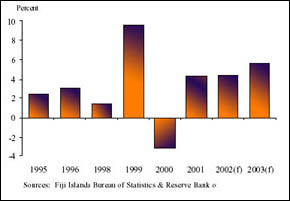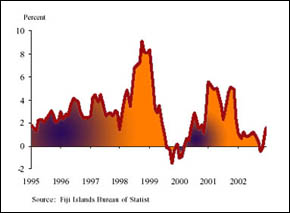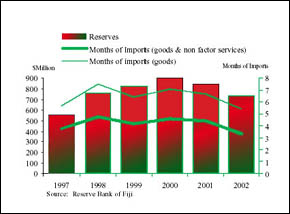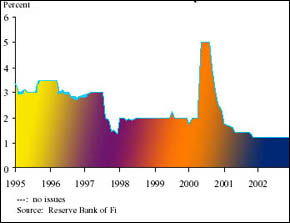 OUR VISION OUR VISION |
Leading Fiji to Economic Success
 OUR MISSION OUR MISSION |
· Enhance our role in the development of
the economy
· Provide proactive and sound advice to Government
· Develop an internationally reputable financial
system
· Conduct monetary policy to foster economic
growth
· Disseminate timely and quality information
· Recruit, develop and retain a professional
team
 OUR VALUES OUR VALUES |
PROFESSIONALISM … in the execution of our
duties
RESPECT ….for our colleagues
INTEGRITY … in our dealings
DYNAMIC…In addressing our customers' needs
EXCELLENCE…in everything
 SUPERVISORY
RESPONSIBILITIES SUPERVISORY
RESPONSIBILITIES |
The functions, powers, and responsibilities of the
Reserve Bank of Fiji (RBF) are specified in the
Reserve Bank of Fiji Act, 1983, Rev 1985.
"The principal purposes of the Reserve Bank
as stated in Part 11, section 4 of the RBF Act
are as follows:-
· to regulate the issues of currency,
and the supply, availability and international
exchange of money;
· to promote monetary stability;
· to promote a sound financial structure;
and
· to foster credit and exchange conditions
conducive to the orderly and balanced economic development
of the country."
 The
promotion of a sound market-based financial system
is the responsibility of the Financial Institutions
Department. The RBF is the supervisory authority
for commercial banks, credit institutions and the
insurance industry in Fiji. The
promotion of a sound market-based financial system
is the responsibility of the Financial Institutions
Department. The RBF is the supervisory authority
for commercial banks, credit institutions and the
insurance industry in Fiji.
 THE OBJECTIVES
OF SUPERVISING THE FINANCIAL SYSTEM THE OBJECTIVES
OF SUPERVISING THE FINANCIAL SYSTEM |
In carrying out its role in "promoting a sound
financial structure," one would presume that
the Reserve Bank of Fiji supervises all finance
and banking activities in Fiji. However, this is
not so.
The Reserve Bank of Fiji focuses only on institutions
that accept deposits from the public and invests
these funds either in loans or investments; currently
only banks and credit institutions. In addition,
the Reserve Bank of Fiji also supervises the insurance
industry comprising insurance companies, brokers
and agents.
While carrying out its supervisory functions,
the Reserve Bank focuses on issues of prudential
concern. Other authorities, including the Department
of Fair Trading, of the Ministry of Commerce,
Business Development and Investment look at consumer
issues.
In supervising the financial system, the Reserve
Bank aims:
· to protect the interest of depositors,
creditors and policy holders of banking and insurance
businesses by setting, promoting, monitoring and
enforcing high standards of integrity and financial
soundness of the institutions it regulates.
· to promote efficient financial system
by promoting consumers' and financial institutions'
confidence in its strength and integrity; and
by ensuring that failure of financial institutions
do not undermine the overall stability and soundness
of the financial system.
The Reserve Bank will pursue these aims in an
efficient way and will:
· acknowledge customers' responsibilities
for their own decisions, while aiming to ensure
that they are not exposed to risks that they are
reasonably be expected to assume; and
· aim to ensure that the costs of regulating
the financial system are proportionate to the
benefits derived from it.
The Reserve Bank consults closely with participants
in the banking and insurance industries and, where
necessary, with other regulatory authorities on
matters of mutual interest affecting our financial
system.
 STRUCTURE
OF THE FINANCIAL INSTITUTIONS DEPARTMENT STRUCTURE
OF THE FINANCIAL INSTITUTIONS DEPARTMENT |
 The
Financial Institutions Department's major objective
is to maintain a sound market-based financial system
through the prudential supervision of licensed financial
institutions. The Department is also tasked with
ensuring the sound operation of insurance companies
and protecting the interests of policy holders.
The Department has four Units: the Policy &
Licensing Unit, 2 Banking Supervision Unit. The
Financial Institutions Department's major objective
is to maintain a sound market-based financial system
through the prudential supervision of licensed financial
institutions. The Department is also tasked with
ensuring the sound operation of insurance companies
and protecting the interests of policy holders.
The Department has four Units: the Policy &
Licensing Unit, 2 Banking Supervision Unit.
The objectives of the Policy and Licensing Unit
are to develop and review policies relating to
the supervision of the financial and payments
system structure and their impact on supervision,
monitor international developments and their impact
on supervision, review new registration and licensing
applications, including applications for renewal
of licenses.
The objectives of the Banking Supervision Units
are to monitor the performances of institutions
and to ensure their adherence to prudential policies
and regulations.
The objectives of the Insurance Supervision unit
are to monitor the performance of institutions
licensed under the Insurance Act through off-site
supervision of the institutions and to ensure
adherence by insurance agents, brokers and companies
to statutory requirements and industry codes of
practice.
 RBF APPROACH
TO SUPERVISING THE FINANCIAL SYSTEM RBF APPROACH
TO SUPERVISING THE FINANCIAL SYSTEM |
In addition to the powers to supervise activities
of banks and credit institutions provided for
under the Banking Act, the Reserve Bank with effect
from 1st January 1999, acquired the statutory
and licensing functions formerly exercised by
the Office of the Commissioner of Insurance. These
functions, which were performed under the Insurance
Act, 1976 are now contained in the Insurance Act,
1998.
In line with this change the Financial Institutions
Department 's interest in these areas has been
expanded to include the protection of the interests
of policy holders of insurance companies.
In developing policies to supervise the financial
system, the Reserve Bank aims at working towards
meeting international standards. Recently, the
Reserve Bank has developed a mission statement
which is more proactive and aims at making our
financial system has an intention of developing
an internationally reputable financial system.
BANK AND CREDIT INSTITUTIONS
Under the Banking Act, the Reserve Bank licenses
and supervises those institutions that accept
deposits from the public. These include commercial
banks and the credit institutions.
Consistent with the Act, the Reserve Bank requires
that financial institutions follow certain prescribed
rules that include adhering to prudential policies
and guidelines. These rules are based on and are
in accordance with the practices recommended for
adoption internationally by the Switzerland-based
Basle Committee on Banking Supervision.
INSURANCE COMPANIES
The Reserve Bank's role under the Insurance Act,
1998 is to formulate "standards governing
the conduct of insurance business and insurance
broking business" and to supervise the "conduct
of agents, brokers and insurer in the Fiji Islands".
The insurance industry in Fiji includes life
insurance companies, general insurance companies
and brokers. There are also hundreds of individual
or corporate agents who have been licensed to
sell insurance products for specific insurance
companies.
 The
Reserve Bank's approach to insurance supervision
include: The
Reserve Bank's approach to insurance supervision
include:
· strengthening of the licensing requirements
for new entrants into the industry;
· ensuring that insurers meet minimum solvency
requirements;
· setting regulations on how the funds
of an insurer or broker may be invested; and
· evaluating the reinsurance arrangements
of insurers to enusre that they are adequate to
cover all risks.
Supervision is mainly done off-site through the
analysis of statutory returns and other reports
submitted by insurers and brokers to the Reserve
Bank of Fiji.
In recent years, the Reserve Bank has been working
on developing these guidelines, the Reserve Bank
looks at practices recommended for adoption internationally
by the International Association of Insurance
Supervises.
|
 RBF QUARTERLY
REVIEW 2002 RBF QUARTERLY
REVIEW 2002 |
GROSS DOMESTIC PRODUCT
The forecast for economic growth in 2002 remained
at 4.4 percent, unchanged from the September quarter.
Most sectors performed well, with the tourism
and wholesale and retail sectors anticipated to
have led growth in 2002.
GDP GROWTH RATE

INFLATION

In the year to December, inflation was 1.6 percent,
up from -0.1 percent recorded in November. Over
the month, consumer prices rose by 1.5 percent,
mainly reflecting higher prices of food, miscellaneous
items, housing and transport. The food category
recorded the most significant increase, and was
mainly underpinned by a rise in prices of volatile
food items such as vegetables and root crops.
The underlying measure of inflation, the trimmed
mean, was negligible at 0.03 percent in December.
In 2003 inflation is expected to pick up. Domestically,
price pressures are expected to rise, reflecting
the increase in the VAT rate by 2.5 percent. However,
as the rise in VAT is a one-off increase in prices,
its effect on inflation is likely to be temporary
and expected to erode by 2004. externally, global
economic conditions remain relatively subdued,
which should mitigate any inflationary pressures
coming through from our major trading partners.
However, risks to this assessment include the
possibility of a war against Iraq, concerns over
North Korea's nuclear programme and the industrial
oil strike in Venezuela which could lead to higher
oil prices. Barring any international shocks,
however, the year-end inflation outlook for 2003
is for moderate inflation.
THE EXTERNAL SECTOR
On the external front, accrual trade data indicate
that cumulative to November, merchandise exports
declined by almost 7 percent, from the corresponding
period last year. This was largely due to declines
in receipts from garments, fish, textiles and
gold, which more than offset increases in earnings
from sugar, mineral water and fruit & vegetables.
GROSS FOREIGN RESERVES

Consistent with the relatively strong domestic
demand, merchandise imports grew by more than
3 percent in the year to November, compared with
the same period in 2001. This was largely due
to higher import payments for investment and consumption
goods, which more than offset a decline in payments
for intermediate goods. The rise in investment
goods was due to an increase in imports of machinery
& transport equipment and chemicals, while
food, beverages & tobacco contributed to the
rise in payments of consumption goods over the
period. Foreign reserves at the end of 2002 were
around $730 million, sufficient to cover 3.4 months
of import payments of goods and non-factor services
or 5.4 months of imports of goods.
DOMESTIC FINANCIAL CONDITIONS
Money Markets
The demand for inter-bank funds in the December
quarter rose significantly, when compared with
the previous quarter, as a result of withdrawals
of maturing term deposits by institutional investors.
Turnover in the inter-bank market during the review
period totalled $133 million, higher than the
$74 million recorded in the September quarter.
Despite the increase in activity in the inter-bank
market, the weighted average inter-bank rate remained
unchanged from the previous quarter, at 0.84 percent.
The Reserve Bank kept its monetary policy stance
unchanged during the December quarter, maintaining
the Bank's announced target policy indicator rate
on the 91-day RBF Notes at 1.25 percent.
RBF NOTES - 91 DAY YIELDS

During the December quarter, there were 48 issues
of RBF Notes totalling $1,408 million. The weighted
average yields on the 14-day, 28-day and 56-day
maturities fell by 16 basis points, 4 basis points
and 3 basis points to 0.63 percent, 0.83 percent
and 1.19 percent, respectively. During the same
period, there were 10 issues of Treasury bills
amounting to $170 million. The weighted average
yields on all Treasury bill maturities fell over
the quarter. In the review period, there were
4 issues of promissory notes in total, by the
Public Rental Board, FSC and the Fiji Development
Bank (FDB), totalling around $21 million. Weighted
average yields ranged from 1.64 percent to 3.06
percent, compared with 1.87 percent to 4.15 percent,
respectively, in the previous quarter.
Capital Markets
During the December quarter, Government issued
$79 million worth of bonds, with maturities ranging
from 3 years to 15 years. The weighted average
bond yields ranged from 2.95 percent to 6.19 percent.
During the same period, the FDB and Housing Authority
issued bonds totalling $49 million with maturities
ranging from 3 to 10 years. Weighted average yields
ranged from 2.92 percent to 5.83 percent.
Foreign Exchange Markets
During the December quarter, the Fiji dollar
weakened against the NZ dollar and the Euro, but
gained against the US and Australian dollars and
the Yen. Fiji's Nominal Effective Exchange Rate
Index, which reflects aggregate exchange rate
movements between the Fiji dollar and the major
trading partner currencies, fell marginally over
the year to December, indicating a slight depreciation
of the Fiji dollar against the basket of currencies.
The Real Effective Exchange Rate Index, a measure
of Fiji's international competitiveness, fell
over the year to December, reflecting an improvement
in the country's international competitiveness.
The favourable outturn was the result of lower
domestic inflation outcomes relative to our major
trading partner countries.
EXCHANGE RATES
Financial Intermediaries
Commercial Bank interest rates fell further in
the year to November 2002, reflecting the Reserve
Bank's continuing accommodative monetary policy
stance. Interest rates are currently at all-time
lows. In the year to November 2002, the weighted
average lending rate on outstanding loans &
advances fell further, by 37 basis points, to
7.84 percent.
INTEREST RATES
The time deposit rate declined by 29 basis points
to 2.14 percent, while the savings deposit rate
fell by 21 basis points to 0.56 percent. Movements
in money and credit aggregates improved further
in the year to November 2002. Broad money rose by
8.44 percent in the year to November 2002, due to
increases in demand deposits (21.2 percent), currency
in circulation (9.4 percent) and savings deposits
(5.3 percent). On an annual basis, total credit
to the private sector rose by 2.9 percent in November,
driven largely by higher commercial bank lending
to the wholesale, retail, hotels & restaurants,
manufacturing, and building & construction sectors,
as well as to private individuals. During the same
period, commercial bank lending to the electricity,
gas & water, real estate, transport & storage
and agriculture sectors was lower.
COMMERCIAL
BANKS LOANS AND ADVANCES
In the year to November 2002, total lending by
Licensed Credit Institutions (LCIs)2 rose by 2.9
percent. While lending by LCIs to the real estate,
building & construction, transport & storage
and other sectors, as well as to private individuals,
was higher in the quarter, lending declined to
the manufacturing, mining & quarrying, public
enterprises, agriculture and professional &
business services sectors.
In the year to November 2002, the weighted average
lending rate on outstanding loans by LCIs fell
by 21 basis points to 14.54 percent. For Non Bank
Financial Institutions, total investment by the
FNPF rose by 2.32 percent in the year to September
2002, following an expansion of 5.49 percent in
the June quarter. The growth was mainly due to
higher holdings of government bonds. In the year
to September 2002, FDB's lending declined by 9.10
percent mainly due to lower lending to the agriculture,
wholesale & retail and real estate sectors,
as well as to private individuals.
Table
1
Table
2
|

